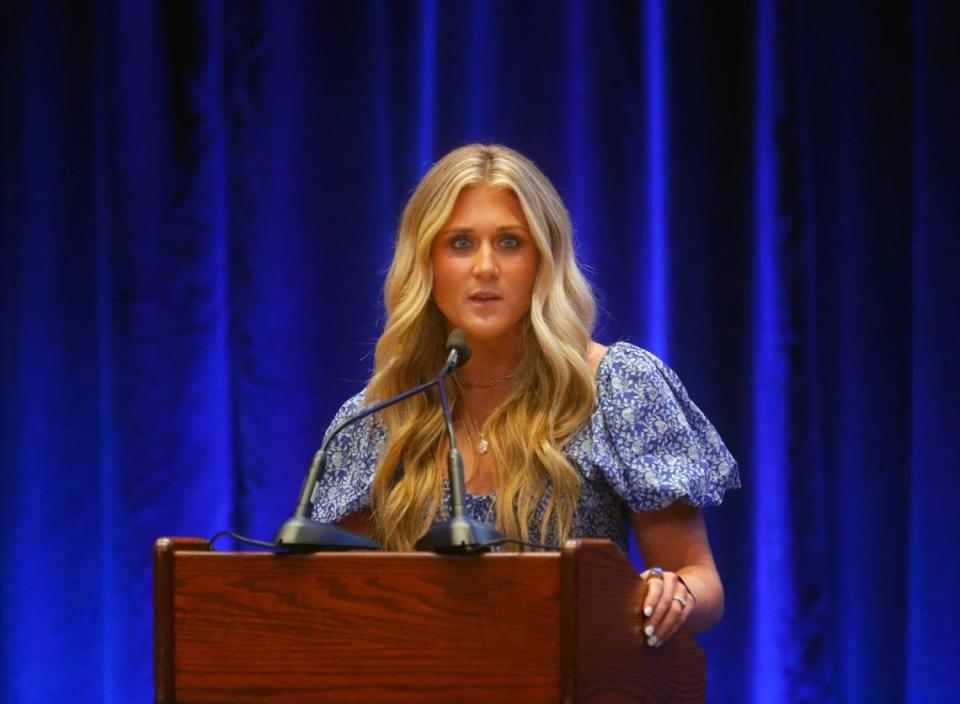Anti-trans sentiment has been a pillar of Cameron’s campaign for governor. Will it backfire?
- Oops!Something went wrong.Please try again later.
- Oops!Something went wrong.Please try again later.
In a windowless room at the back of a strip-mall restaurant in Hazard, Daniel Cameron said school teachings on gender and allowing transgender girls to play girls’ sports threatened Kentucky’s true values.
“We need to make sure our schools are about reading, writing and math, and they’re not incubators for liberal and progressive ideas,” the Kentucky GOP nominee hoping to unseat Gov. Andy Beshear said on a humid morning in late July.
“You’ve also had a governor who has said that he’s OK with biological males playing in women’s sports,” Cameron told the crowd. “Your values are at stake in this race for governor.”
Cameron, 37, repeated this message to more supporters later that day in Whitesburg. Then again in Harlan. For months, that message was ratcheted up, piped into thousands of homes via cable and YouTube campaign advertisements, paid for by political action committees supporting but not affiliated with Cameron.
One such commercial begins with a person dressed in drag reading a children’s book. “The radical transgender agenda,” a narrator begins in a voiceover, conflating people in drag with being trans. “It’s bombarding our children everywhere we turn. Child sex changes with permanent consequences. That’s Andy Beshear’s Kentucky.”
This ad and others prompted Beshear to release his own in response, in which he states, “These attacks on me by Daniel Cameron are not true.”
Though trans kids make up an estimated 0.7% of Kentucky’s ages 13-17 population — roughly 2,000 teens — according to a 2022 study from the Williams Institute, Cameron has magnified their existence into a focal point in his gubernatorial bid. And he has repeatedly backed a narrative that paints the trans community as a danger to core family values.
On the coattails of a legislative session defined by the passage of anti-trans policies, Cameron’s bid for governor has tacked far-right in hopes that leaning heavily into charged culture war issues will play well with swing voters, his campaign told the Herald-Leader.
Though he has defended the same trans-targeting policies passed by his party — and appointed a champion of those laws as his running mate — Cameron’s rhetoric on the campaign trail has aligned more with the GOP’s ideological extreme. Republicans who portray being trans as sinful and biblically immoral have found refuge in his candidacy.
This is leaving some in the GOP questioning whether Cameron’s choice to veer from the political middle in an attempt to unseat a relatively well-liked moderate Democratic incumbent is a winning strategy.
“Do I think this is the issue that’s going to be a motivating reason to not vote for Beshear?” asked Sen. Amanda Mays Bledsoe, R-Fayette, who voted in favor of SB 150 despite having reservations about it. “It will be for some. But the economy, inflation and public safety are bigger motivators for most voters I hear from.”
That checks out, said University of Kentucky political science Professor Stephen Voss.
“Fighting to defend the status quo on trans issues probably plays pretty well with swing voters,” he said, “It’s just not necessarily very important to them.”

These issues matter to Kentuckians, but how much?
After the crowd dispersed at Cameron’s campaign stop in Hazard, Gary McIntyre, 65, lingered in the parking lot.
McIntyre, of Viper, considers himself a moderate Republican and not a single-issue voter. He says he doesn’t mind Beshear, but says Cameron better keeps in check what he characterizes as overreach by Democratic President Joe Biden.
“He’s the last line of defense,” McIntyre said, leaning against his car.
What he is moved less by is Cameron’s position on trans rights. To McIntyre, the threat of those policies are not abstract. McIntyre has a family member who is trans, and while he loves and supports him, he has admittedly struggled to understand aspects of that identity.
“I don’t really understand why someone would want a particular pronoun, but if my (family member) says, ‘Hey, call me this or that,’ I try to do it,” he said. “I told him he’d just have to be patient with us.”
As McIntyre sees it, the larger issue with Kentucky’s recent ban on gender-affirming health care for trans kids — Senate Bill 150 — is a liberty one: “If parents have the right to oversee what’s being taught in schools to their children, and the right to oversee general medical care for their children,” he said, then “if they’ve got a child that feels they might be the wrong gender, I don’t think the government should be involved in the health care they seek for their child.”
Of the issues that McIntyre ranks as most important when considering for whom to vote, being alarmist about trans kids isn’t one of them. If anything, knowing a trans person makes him more likely to pay attention to policies that impact them.
McIntyre said he believes liberal indoctrination in schools is real, and that parents of trans kids should get to choose health care options for their kids, free from government intervention.
A few weeks after Cameron’s Eastern Kentucky campaign stops in July, he was joined in August by the GOP’s slate of constitutional officer hopefuls in chiming more anti-trans sentiments. This time, it was to a boisterous crowd of hundreds at Fancy Farm, the state’s oldest political event.
“The governor has the audacity to lecture rural Kentuckians on right and wrong when he and Joe Biden can’t even tell the difference between a man and a woman,” Cameron shouted into a microphone at the West Kentucky church picnic. He stoked the issue as black and white, accusing Beshear of “demanding that boys play in girls’ sports” and said the governor “protects transgender surgery for kids.”

Outgoing GOP State Auditor Mike Harmon told the crowd, “Please don’t be deceived: There’s only one party that wants to protect your children’s innocence, protect your sanctity, protect your Kentucky family values. That’s the Republican party.”
While these lines earned raucous applause from Cameron supporters, nuanced perspectives like McIntyre’s in Hazard likely better represent the general electorate, said Kent State political science professor Professor Patrick Miller. He’s been surveying American opinion on transgender policies since 2015.
“Take the health care issue with children,” he said. “A lot of people might be uncomfortable with what that involves, but do they necessarily think the government needs to regulate health care decisions, especially when it comes to children and what their parents want for them? No.”
This ambiguity might actually better situate GOP messaging on this issue, Miller said: “You can speak about it and not really alienate that suburban swing voter, but you can hopefully motivate that base, which is white evangelical conservatives.”
In the wake of the overturning of federal abortion protections last year, as the GOP searches for a new unifying social issue to rally its base behind, some Republicans are reaching for trans-rights as that silver bullet.
And in a conservative state like Kentucky, a majority of voters probably do agree with parts of SB 150, sources interviewed for this story said. Close to 60% of adults in a Washington Post-Kaiser Family Foundation poll this spring said a person’s gender is determined at birth.
But that’s different from the issue being one that galvanizes a wide swath of the electorate into voting for a candidate.
“A huge number of Republican base voters are on board with restrictions on trans peoples’ civil rights,” said Rebecca Blankenship, Kentucky’s first openly trans elected official and executive director of Ban Conversion Therapy. “What they don’t have is voters who care a lot about doing that.”

So, when a candidate like Cameron leans heavily on those issues, it’s more likely to reaffirm his staunchest supporters, rather than rope in bigger parts of the constituency, Miller, Voss and Blankenship said.
“For most people who can even give you an opinion, they still don’t care very much,” Miller said. “This is just not a particularly important issue to the average person out there.”
‘Seeing this myopic message fail’
Cameron’s messaging reached a fever pitch in late August, when he addressed a crowd of paying guests at the Jefferson County Republican Party’s Lincoln Day Dinner, alongside U.S. Sen. Rand Paul and former University of Kentucky swimmer Riley Gaines.
Gaines has become a crusader among right-wing conservatives for her brash criticism of trans women competing in women’s sports. In 2020, Gaines tied Lia Thomas for fifth place in an NCAA championship race. At Fancy Farm, Cameron supporters waved a poster board showing Beshear and Thomas on one side and Gaines by herself on the other, with the caption, “Team Kentucky” under Beshear and “Real Kentucky” under Gaines.
In the past, Gaines has compared being trans with the racist caricature of white people wearing blackface.
“The changing of the language, the denying of truth, the silencing, the breakdown of faith, the breakdown of our families,” she said that evening to breakouts of applause. “They want to control what we think, what we say, how we feel.”
“It’s no longer right versus wrong, good versus bad. This really is moral versus evil,” Gaines said with a grave expression. “And I’ve looked this evil in the eyes.”

Cameron, the keynote speaker that evening, took the stage after Gaines and emphasized the need to “protect the family unit” from these outside forces intending harm. He called Gaines’ quest “commonsense.”
“Let me tell you what the Cameron-Mills administration will stand for,” he told the Louisville crowd. “We will protect our kids from transgender surgeries (and) we will protect women’s sports.”
The GOP has insisted they have polling that buttresses their position: 66% of voters said they supported a policy like SB 150, according to a poll this winter mentioned during the session by House Speaker Pro Tem David Meade, R-Stanford. That poll has never been made public.
Conversely, a local January survey from Mason-Dixon Polling and Strategy, commissioned by the Fairness Campaign, a pro-LGBTQ advocacy group, found 71% of Kentuckians polled did not support a law that would allow the state to “overrule parents’ decisions to obtain certain health care for their transgender teenager.”
When contacted for this story, Cameron’s campaign pointed to a 2022 Gallup poll showing 69% of Americans believe trans athletes should only be allowed to compete on sports teams that conform with their birth gender.
“Most people in Kentucky think that boys shouldn’t play girls’ sports, be in girls’ bathrooms, or that children should undergo sex change surgery before they turn 18,” Cameron’s team said in a statement to the Herald-Leader. “In fact, Andy Beshear’s support of these positions will alienate swing voters.”
Still, polls are not scientific. The degree to which Cameron’s policy stance resonates with voters is largely untested, said Rep. Savannah Maddox, R-Dry Ridge, who championed SB 150.
“We don’t have empirical data about how it translates to electoral politics,” Maddox said. “This is the first time we have had this particular issue at the forefront in a statewide race.”
On a smaller scale, Kentucky was afforded a glimpse earlier this summer of how these issues resonate within the Republican party.
Kelly Craft, who pumped more than $9 million of her own dollars and collected millions more in donations, ran a GOP primary campaign that leaned harder than any candidate, including Cameron, on combating “anti-wokeness.”
Her running mate, state Sen. Max Wise, R-Campbellsville, was the lead sponsor of SB 150. Craft released a television ad that showed purple-haired teachers parachuting into classrooms to teach critical race theory and force children to state their pronouns.
During a televised town hall, she proclaimed that under a Craft-Wise Administration, “We will not have transgender.” She then name-dropped Gaines, the UK swimmer with whom she also campaigned, saying, “if you hear her story, you will understand.”
Craft came in third in the primary.
Granted, a primary is not a general election. But general elections in other states with mirrored political makeups and messaging have fared similarly.
In Kansas, GOP Attorney General Derek Schmidt ran a gubernatorial campaign ideologically similar to Cameron’s last year, in hopes of unseating Democratic Gov. Laura Kelly.
Kansas, like Kentucky, has a Republican supermajority in both chambers and a Democrat in the governor’s office. Those bodies passed a ban on trans girls playing girls’ sports, and Kelly, like Beshear, vetoed it.
Kansas, like Kentucky, rejected a similar constitutional amendment to remove inherent abortion protections last year. And, like Kentucky, Kansas voted twice for former President Donald Trump with double-digit margins.
Schmidt campaigned on a need for a statewide ban on trans girls playing girls’ sports. He also appeared alongside Gaines, vowing to sign an executive order that would keep that population out of girls’ sports in all levels of education.
Schmidt lost by 2 percentage points, and Kelly became only the fifth Democratic governor in Kansas’ history to win re-election.
“We are seeing this myopic message fail all over the country,” said Michael Frazier, a Republican lobbyist in Frankfort, who is gay and has been openly critical of his party’s stance on LGBTQ issues.
After Kentucky’s primary, “we saw Senate Minority Leader Mitch McConnell come out and talk about the need for quality candidates, and the fact that extremes cost us in the midterms from having an overwhelming majority in Congress,” Frazier said. “Frankly, my concern as a young Republican is that if we hold on to outworn principles of the past, the world will move on.”
While Cameron is slightly more veiled than Craft in his characterization of trans people and related policies, he is still taking a page out of that playbook.

In July, when he announced Mills as his running mate, Cameron praised him for being the “first person in Frankfort to sound the alarm about radical gender ideology.”
Cameron’s campaign continues to highlight Beshear’s vetoes as proof that the Democrat is a radical. In August, Cameron’s released an ad calling Beshear a liar, saying, “Beshear did everything in his power to allow permanent gender reassignment surgery for children.”
It’s a reference to Beshear’s veto of SB 150, an omnibus bill that included the gender-affirming surgery ban. Though Beshear has explicitly said he does not support such surgeries, Republicans have nonetheless pointed to this move from the governor as an endorsement of them. The bill “allows too much government interference in personal health care issues and rips away the freedom of parents to make medical decisions for their children,” Beshear said in his veto message.
Mills also spearheaded the move to ban trans middle and high school girls from girls’ sports, first in 2020. It took until 2022 for the General Assembly to make it law, and Mills was the lead sponsor.
Beshear vetoed it, too, citing Kentucky High School Athletic Association policy that endorsed the participation of trans athletes in school sports. Though the GOP supermajority overrode Beshear’s veto, it’s a point Mills has continued to parrot throughout the campaign.
“Yesterday, President Biden’s spokesperson called men playing in women’s sports a ‘complicated issue,’” Mills tweeted in late August. “Andy Beshear vetoed my bill to keep men from playing in women’s sports. Two peas in a pod…captive to radical gender ideology.”

